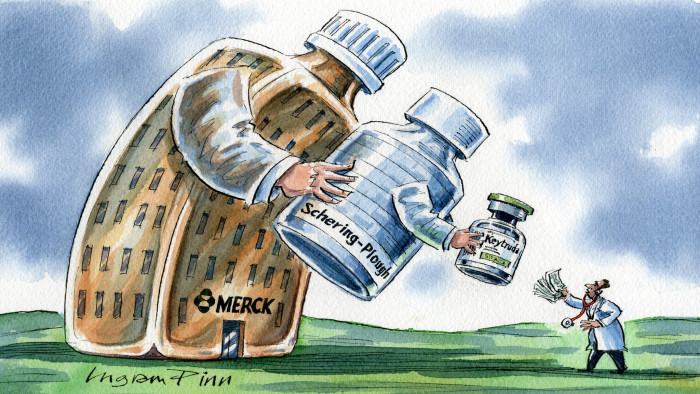Keytruda shows the high price of curing cancer

Simply sign up to the Pharmaceuticals sector myFT Digest -- delivered directly to your inbox.

A decade ago, the US pharmaceuticals company Merck paid $41bn to acquire Schering-Plough, consolidating and cutting thousands of jobs amid an industry crisis of innovation and confidence. The companies touted their cholesterol and HIV treatments, briefly noting a “promising pipeline” in oncology.
Hidden in that pipeline was Keytruda, an antibody that enables the body’s immune system to attack cancers. It was an accidental acquisition, initially ignored by Merck and almost discarded but now its main blockbuster, with sales expected by JPMorgan to hit $16bn a year by the mid-2020s. It extends patients’ lives longer than chemotherapy alone, albeit expensively.
Rapid innovation in oncology drugs such as Keytruda and genetic medicine has prompted another merger wave. Bristol-Myers Squibb agreed to acquire Celgene for $90bn in January, GlaxoSmithKline agreed to buy the US biotech Tesaro for $5.1bn in December, and Eli Lilly said last month it was acquiring Loxo Oncology for $8bn.
It is an exciting time for an industry that for many years struggled to make research and development produce results. It is also a welcome shift away from the mass marketing of primary care pills towards medicines for the gravely ill. This week, Keytruda was found to improve the health of patients with kidney cancer and with glioblastoma, an aggressive brain tumour.
But it begs questions about the future of pharma companies. One is whether they are more innovative than before, despite this activity. The second is how long the buzz about cutting-edge oncology can convince insurers and healthcare systems to pay bills that are already high and may rise higher.
Keytruda illustrates how the industry now works — it was discovered by a Dutch pharma company that Schering-Plough bought in 2007, rather than in one of either group’s research laboratories. Merck’s role, when it finally realised what it was sitting on (thanks to seeing Bristol-Myers nurturing a rival drug called Opdivo) was to put Keytruda through trials and develop it.
Keytruda and Opdivo are enormously important drugs in the developing field of cancer immunotherapy. They are “checkpoint inhibitors” that prevent the body blocking an immune response to cancer cells. Since Keytruda’s first approval in the US in 2014, it has been used to treat an expanding range of cancers, sometimes alone but often combined with other drugs.
This success has pushed other pharma companies to acquire biotechs, or to form partnerships to develop similar drugs, and others that can be used with them. A lot of drug discovery is done in biotech start-ups — the consultancy McKinsey estimates that 69 per cent of the portfolios of high-growth pharma companies came from acquisitions or licensing in 2015.
That avoids the risk of working for years on a drug that fails, but it creates other challenges. A pharma group that in effect outsources early stage research can suffer from a brain drain — it may lack scientists who can assess properly which deals to strike with biotechs. It can also struggle to make the most of the drugs it acquires from others by widening their applications.
This way of running the industry inflates prices. Biotech drug discovery is a risky endeavour, so investors (and research scientists who leave safe jobs) want to be rewarded richly for success. The wave of oncology innovations encourages the fear of missing out among drugmakers — recent deals show how high a price they will pay to secure their future.
In the end, the patient pays. In November, Keytruda was approved for use in the UK’s National Health Service. The list price for each three-weekly infusion is £5,260, and the average cost for a course of treatment is £84,000, although the NHS gets a discount. The official price for Kymriah, a personalised leukaemia drug from Novartis, is £282,000 per treatment.
Innovative drugs are not only expensive to develop but difficult to spurn. An oncologist may have one chance to save a patient’s life and will pick the medicine with the best shot. That curbs the pressure to cut prices, in contrast with pills with generic competition or, for example, a hepatitis C drug with a rival that might also be effective.
In some ways, the market is working — such is the ferment of innovation stimulated by these rewards that rivals for drugs such as Keytruda are popping up faster than before. If cancer were less complex, one could expect prices to start falling; US President Donald Trump’s campaign against “the injustice of high drug prices” paid by Medicare would produce results.
But we are decades away from anything like a “cure for cancer” and one medicine is rarely enough — many pharma groups are working on drugs for use in combination with Keytruda or Opdivo. Not only will this make splitting the rewards difficult but the overall price will rise rather than fall. It is hard to deny any patient an extra year of life but the bill will be fearsome.
For now, the industry is enjoying a burst of profitability and dealmaking, with high prices justified by life-saving innovation. It knows one thing from history: the halo will fade.
Comments